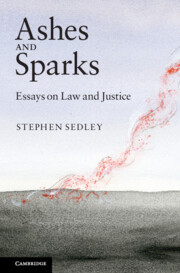Book contents
- Frontmatter
- Contents
- Preface
- Acknowledgements
- PART I History
- PART II Law
- 12 Justice miscarried
- 13 Breaking the law
- 14 Declining the brief
- 15 Big lawyers and little lawyers
- 16 Parliament, government, courts
- 17 Judges in lodgings
- 18 Mice peeping out of oakum
- 19 Justice in Chile
- 20 Never do anything for the first time
- 21 Rarely pure and never simple
- 22 Law and plumbing
- 23 The Laws of Documents
- PART III Justice
- Index
13 - Breaking the law
Published online by Cambridge University Press: 05 June 2012
- Frontmatter
- Contents
- Preface
- Acknowledgements
- PART I History
- PART II Law
- 12 Justice miscarried
- 13 Breaking the law
- 14 Declining the brief
- 15 Big lawyers and little lawyers
- 16 Parliament, government, courts
- 17 Judges in lodgings
- 18 Mice peeping out of oakum
- 19 Justice in Chile
- 20 Never do anything for the first time
- 21 Rarely pure and never simple
- 22 Law and plumbing
- 23 The Laws of Documents
- PART III Justice
- Index
Summary
This article, published in the London Review of Books in 1989 when I was at the Bar, looked at two government Green Papers, one on the work and organisation of the legal profession, the other on conditional fees – a money-saving alternative to legal aid, bringing joy to the heart of the Treasury, eventually implemented by the Blair government, and now a public interest nightmare.
Connoisseurs of fine ironies will be slapping their thighs at the sight of the Bar and the government with their teeth sunk in each other's legs, the former egged on by the judiciary, the latter by Dennis Skinner. It's a fair guess that three-quarters of the Bar are loyal Tory voters. Yet how many of them, and indeed of their colleagues in the centre and on the left, had understood that Thatcherism is not just a tougher brand of Conservatism? What patrician Tories despise as the mentality of the Grantham grocer (as their parents despised Hitler for his vulgarity rather than his politics) is in truth a gut ideology which has no time and no room for any power elite that claims its status as a matter of right. Privilege, inequality, selfishness, exclusivity: these are of course important values, but they are to be earned in a cut-throat marketplace, not gerrymandered in the collegiate seclusion of the Inns of Court.
- Type
- Chapter
- Information
- Ashes and SparksEssays On Law and Justice, pp. 147 - 152Publisher: Cambridge University PressPrint publication year: 2011



